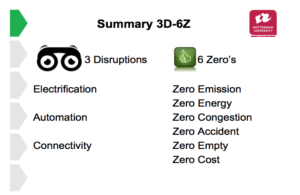Will the automotive era come to an end in the 21th century? Looking at today’s environmental and economic challenges of the use of cars based on last century technology and listening to some trend watchers one could think so.
Auto-mobility is growing
Cars can be regarded, as an old school status product indeed, for which there is no use, no place, no money and no interest in our modern society. On the other hand, auto-mobility is still growing, both in developed as in developing countries. The current worldwide road travel by motorbikes, cars, trucks and busses will probably double to 80 trillion kilometers in 2050.
Research by Rotterdam University of Applied Science
Facing comparable mobility growth in the Dutch Port City areas of Rotterdam, research by the Rotterdam University of Applied Science describes developments in automotive and providing first living lab experiments. In our vision, the traditional automotive values ‘individual freedom and flexibility’ and using new disruptive technologies, vehicles will very likely consolidate their position as preferred choice for mobility of persons and goods during the 21st century.
Disruptions
To achieve that the sustainable disruptions: Electrification, Automation and Connectivity (sharing) must be adopted. Meanwhile one should focus on tempting goals, the Six Zero’s; Zero Emission, Zero Energy, Zero Congestion, Zero Accident, Zero Empty and Zero Cost. These goals will guide society towards a new economy, sustainable ecology and more efficient use of time.
The full research paper by the Rotterdam University of Applied Science is available here.
Source:
EVS30 Symposium
Stuttgart, Germany, October 9 – 11, 2017
Automotive, the Future of Mobility
F.G. Rieck MSc, C. Machielse MSc, J.H.R van Duin MSc PhD
Research Centre Sustainable Port Cities, Rotterdam University of Applied Science
Faculty of Technology, Policy and Management. Delft University of Technology

